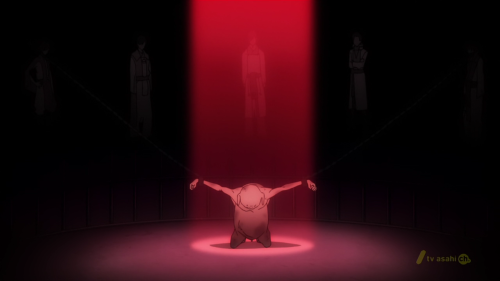The end of a season is a bittersweet time for anime fans, as the joy of seeing a series reach its climax is undercut by the knowledge that this is the last hurrah for a story we’ve grown attached to over time. Such is the case with Shin Sekai Yori (From the New World,) a series that had me under its spell from the first episode on. Unpredictable, challenging and artistic are but three ways to describe the experience of watching it. Indeed, it has all the things that critics like me love to see in anime, but more importantly, this isn’t merely a cold essay on human nature, it’s emotive, and ends beautifully, with a trademark mix of the horrifying and hopeful.
I’m a pretty big fan of George R. R. Martin’s still ongoing A Song of Ice and Fire series. When comparing that to Tolkien’s fifties-era The Lord of the Rings trilogy, a friend mentioned that one of the main differences is the depiction of good and evil. In Tolkien’s books, Sauron is the clear antagonist, evil incarnate. There’s a clear dividing line between him and the Fellowship, 2 sides, vying to save or destroy the world. In A Song of Ice and Fire, there’s more like 5 sides fighting against each other for little more than bragging rights. It’s massively complex in comparison to The Lord of the Rings, but is also a story more relevant to our generation.
With the way it ends, the same could be said of Shin Sekai Yori. The queerrats become the antagonists in the second half of the story by invading human villages. They are ugly, inhuman and show no mercy. We fear them as much as the characters do, and when they are finally defeated, I caught myself breathing a sigh of relief, but what comes next is horrifying. The queerrats’ leader, Squealer, is put on trial for his war crimes, and, quite frankly, his reasons for fighting make sense. The queerrats have been treated like slaves, forced to comply or face the extinction of their colonies. As Squealer says, it isn’t that they hate humans, but rather, how can an intelligent species be expected to thrive when even the tiniest of transgressions could mean the end for them all? Thinking right back to the beginning of the series, Saki and co. come across a queerrat drowning in a stream: Saki saves him, but, more importantly, the others were quite happy to just keep on walking.

Stripped naked and put on trial, Squealer screams at the judge that he is human. Everyone in the room just laughs. He’s then bound by their Cantus’ (telekinesis,) and sentenced to ‘Eternal Hell,’ a disgusting form of torture that deforms his body yet forces him to keep living, experiencing excruciating pain in his every waking second. Him screaming “My name is Squealer” is as haunting as it is sad, and comes to symbolise Shin Sekai Yori’s parting shot. Hostilities may have ceased, but the war is far from won. Squealer was their equal, an intellectual and brave individual, rewarded with nowt but serfdom, indignity and torture. He deserved his freedom.
From that, we’re left with Saki and Satoru. They get married, she falls pregnant. She might now be the village leader. Have they learnt from past mistakes? As laughter echoes around their old school, that’s left for us to contemplate. Like Legend of the Galactic Heroes before it with Mittermeyer’s last line, “you too, Felix?”, all of our hopes for a better future are left in the hands of our children.
The power of imagination is what changes everything.

Leave a Reply